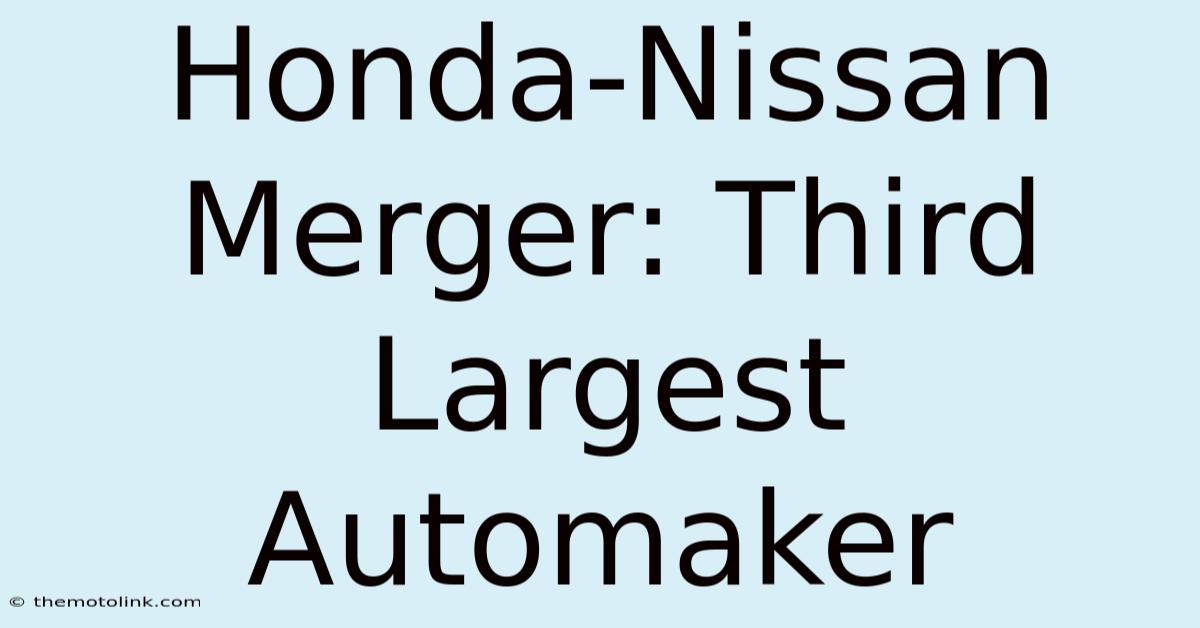Honda-Nissan Merger: Third Largest Automaker

Discover more detailed and exciting information on our website. Click the link below to start your adventure: Visit Best Website nimila.me. Don't miss out!
Table of Contents
Honda-Nissan Merger: Creating the World's Third Largest Automaker?
A hypothetical merger between Honda and Nissan would reshape the global automotive landscape, creating a behemoth capable of challenging industry leaders Toyota and Volkswagen. This potential union has sparked considerable speculation, fueled by increasing pressure on automakers to consolidate and invest in electric vehicle (EV) technology.
The Allure of a Honda-Nissan Alliance
The idea of a Honda-Nissan merger isn't entirely new; whispers of collaboration have circulated for years. However, the current economic climate, characterized by rising production costs, intensified competition, and the urgent need for massive EV investments, makes the prospect increasingly attractive. A combined entity would immediately become the world's third-largest automaker, surpassing Stellantis and potentially closing the gap with Toyota and Volkswagen. This scale offers several compelling advantages:
- Economies of Scale: Combining manufacturing, research, and development resources would dramatically lower production costs, boosting profitability and allowing for greater investment in crucial areas like battery technology and autonomous driving.
- Expanded Market Share: Honda's strong presence in North America and Asia, coupled with Nissan's robust position in key global markets, would create a truly global automotive giant with significantly broadened reach.
- Technological Synergies: Merging the engineering expertise of both companies could lead to faster innovation and the development of superior vehicles, encompassing both traditional combustion engines and cutting-edge electric and hybrid models.
- Enhanced Negotiating Power: A larger, more powerful entity would have greater leverage in negotiations with suppliers, allowing for better pricing and access to critical raw materials.
Challenges and Potential Hurdles to a Merger
While the potential benefits are significant, several obstacles could hinder a successful merger:
- Cultural Differences: Honda and Nissan, while both Japanese companies, have distinct corporate cultures. Successfully integrating these different work styles and management philosophies would require careful planning and execution.
- Brand Identity: Maintaining the distinct identities and brand equity of both Honda and Nissan would be crucial to avoid alienating loyal customers. Balancing brand independence with operational synergy will be a key challenge.
- Regulatory Hurdles: Antitrust regulations in various global markets would need careful consideration. Authorities might scrutinize the merger for potential monopolistic practices, particularly in certain geographic regions.
- Shareholder Approval: Securing the approval of shareholders from both Honda and Nissan would be a complex process requiring significant negotiation and convincing arguments about the long-term strategic value of the merger.
Exploring the Future of Automotive Consolidation
The potential Honda-Nissan merger underscores a broader trend in the automotive industry: consolidation. Facing rising costs and the immense investment required for EV transition, automakers are increasingly exploring mergers, alliances, and joint ventures to bolster their competitiveness. This trend is likely to continue, shaping the automotive landscape in the coming years. The success of any such merger hinges on effective integration strategies, careful brand management, and a clear vision for the future.
The Road Ahead: Predictions and Implications
The possibility of a Honda-Nissan merger remains a fascinating area of speculation. If it were to materialize, it would undoubtedly create significant ripples throughout the global automotive industry. We could see:
- Accelerated EV Development: Increased investment in battery technology and charging infrastructure.
- Enhanced Autonomous Driving Capabilities: Joint development and implementation of advanced driver-assistance systems (ADAS).
- Reshaped Market Dynamics: A more concentrated automotive market with fewer major players.
- Increased Competition for Toyota and Volkswagen: A renewed challenge to the current industry leaders.
What are your thoughts on a potential Honda-Nissan merger? Do you believe it’s a viable option, and what are the potential benefits and drawbacks in your view? Share your opinions in the comments below!
(Suggested Images): A collage of Honda and Nissan logos, a graph showing the market share of major automakers, a picture of a futuristic electric vehicle.)
(Internal Links): (Link to an article on the EV market), (Link to an article on automotive industry trends), (Link to an article on Japanese automotive history).
(External Links): (Link to a reputable source discussing automotive mergers and acquisitions), (Link to a financial news article about Honda or Nissan).
(FAQ Schema Markup Suggestions):
- Q: Will a Honda-Nissan merger affect car prices? A: Potentially, depending on economies of scale and other factors.
- Q: What are the biggest challenges to a Honda-Nissan merger? A: Cultural differences, regulatory hurdles, and shareholder approval.
- Q: When might a Honda-Nissan merger happen? A: Currently, there are no concrete plans; it remains speculative.
(Meta Title): Honda-Nissan Merger: Creating the World's Third Largest Automaker?
(Meta Description): Explore the potential impact of a Honda-Nissan merger, examining the benefits, challenges, and implications for the global automotive landscape.

Thank you for visiting our website wich cover about Honda-Nissan Merger: Third Largest Automaker. We hope the information provided has been useful to you. Feel free to contact us if you have any questions or need further assistance. See you next time and dont miss to bookmark.
Featured Posts
-
Celtics Short In Orlando Tatum Absent
Dec 24, 2024
-
Celtics Magic Game 4 Post Game Insights
Dec 24, 2024
-
Packers Shutout Saints Make Playoffs
Dec 24, 2024
-
Celtics Vs Magic Where To Watch
Dec 24, 2024
-
Nolans Next Film The Odyssey
Dec 24, 2024
